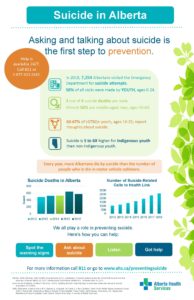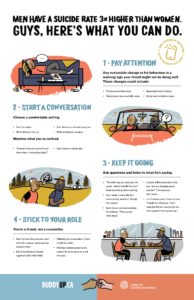If a conversation could save a life, would you have it? What if that conversation was about mental health and suicide? What if the life in question was your brother’s, father’s, son’s, or loved one’s?

Every year over 500 people in Alberta die by suicide, with men making up the majority of that number with rates three times higher than that of women.
“We’re socialized to be stoic and self-sufficient,” says Robert Olson, a librarian and writer with the Centre for Suicide Prevention. “So a mental health issue is thought about as a failing that a man should be able to overcome by himself.”
The stigma around mental health means that men often ignore their stressors or look to suppress their emotions by engaging in risky, unhealthy behaviours.
Potential symptoms when mental health is neglected include alcohol and drug abuse, promiscuity, and uncontrolled anger. These symptoms can have a ripple effect on the communities where people live, which further highlight the necessity of supporting people with their mental health journey.
“In our various coalitions across our communities, we’re seeing increases in suicide, domestic abuse, and addiction,” shares Rebecca Aspden, a practice facilitator with the Wolf Creek Primary Care Network (PCN). “Our PCN does have mental health supports, but consistently it’s women, 75 per cent or more, [who] use our resources. There’s still that disconnect with reaching men, so we really want to normalize [men’s mental health issues] and reduce the stigma, so men will start asking for help as well.”
But there’s no perfect answer, it’s really about learning and growing the process in the context of the community,” she continues. “This is a journey for us all individually and … collectively.”
In order to do this, communities and organizations need to look at mental health differently than they do when they are dealing with women, who are more likely to confide in friends and family and reach out for help when they need it.
“There’s more to be learned around which strategies will best support men,” says Jessica Turowski, project manager with the Rural Mental Health Project. “I think traditionally some of the strategies that we’ve used, like counselling, tend not to be as helpful [for men].”
“But there’s no perfect answer, it’s really about learning and growing the process in the context of the community,” she continues. “This is a journey for us all individually and … collectively.”
For the communities served by the Wolf Creek PCN, including Innisfail, Sylvan Lake, Delburne, Ponoka, and Rimbey, this effort comes in the shape of a new campaign called Real Talk with Men.
Set to launch in November, thanks to a partnership with Innisfail Family and Community Support Services, the initiative will kick off with a calendar campaign featuring men’s mental health, as well as educational opportunities initiated by the community.
“[The calendar] features local men that other men would look up to,” says Aspden, explaining that 30 men, ranging from bull riders to doctors, volunteered to get involved with the campaign. “Some [pictures] are of individuals and some are of groups, but each of the men [is] doing a writeup on their personal experiences with mental health and why they think it’s important to talk and break down those barriers.”
“Then, we’re going to be running some educational series for men on how to talk with their friends or family members who are struggling,” she continues. “That’s something that came [from the community]; they really would like to know how to start those conversations.”
[The calendar] features local men that other men would look up to…Some [pictures] are of individuals and some are of groups, but each of the men [are] doing a writeup on their personal experiences with mental health and why they think it’s important to talk and break down those barriers. – Rebecca Aspden, practice facilitator, Wolf Creek Primary Care Network.
The goal of the campaign is to create environments and opportunities where men can feel comfortable talking amongst themselves where they spend their time, whether it be in local eateries and pubs, athletic facilities, or even where they work.
“Not everyone reads the newspaper and not everybody’s on Facebook, but there has to be a way that communities can pull together,” says Kimmy Krochak, an emotional awareness coach based out of Killam.
“Out here with rural, it’s farming, oil, and gas. Things have been pretty scary here the last few years with oil and gas, but I think it’s [about] getting into those companies that have these men and giving them a new way to look at things.”
According to Krochak, having these conversations in the workplace can help to show men that they aren’t alone in how they feel and that other men, just like them, face similar experiences.
Encouraging these discussions around mental health is the key to breaking down stigma, something she believes needs to start at a much younger age.

“I would love to have [these conversations] in schools and in parenting classes. We learn to do our taxes, but we don’t learn [emotional awareness],” says Krochak, who works every day to create opportunities to discuss mental health with her own son.
“Mental health [issues are] so universal to everyone at any age, and that’s okay. It’s who we are.”
This message of acceptance is one that’s growing across the province as more and more communities look for ways to support and stand by those struggling in silence.
“We are definitely seeing that more communities [want] to take additional actions and aren’t okay with the … status quo,” says Turowski, explaining that over 200 Alberta communities have expressed interest in the Rural Mental Health Project.
“It’s important for everyone to talk about mental health, and not just as an ‘us or them’ problem, but individually and collectively,” she adds. “[When] we’re able to speak honestly and openly about the challenges that we’re facing, it assists us with other stressors and challenges in our life.”
To learn more about men’s mental health or how to reach out to someone who’s struggling, visit- www.suicideinfo.ca/resource/men-and-suicide/ or https://alberta.cmha.ca/news/men-mental-health-how-to-start-the-conversation-about-your-mental-health/
—Lesley Allan
Did you enjoy this article?
Subscribe to the Rural Health Beat to get a positive article about rural health delivered to your inbox each week.
Oops! We could not locate your form.
